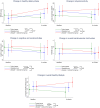Integrating a multimodal lifestyle intervention with medical food in prodromal Alzheimer's disease: the MIND-ADmini randomized controlled trial
- PMID: 38812047
- PMCID: PMC11138035
- DOI: 10.1186/s13195-024-01468-x
Integrating a multimodal lifestyle intervention with medical food in prodromal Alzheimer's disease: the MIND-ADmini randomized controlled trial
Abstract
Background: The Finnish Geriatric Intervention Study to Prevent Cognitive Impairment and Disability (FINGER) showed cognitive benefits from a multidomain lifestyle intervention in at-risk older people. The LipiDiDiet trial highlighted benefits of medical food in prodromal Alzheimer's disease (AD). However, the feasibility and impact of multimodal interventions combining lifestyle with medical food in prodromal AD is unclear.
Methods: MIND-ADmini was a 6-month multinational (Sweden, Finland, Germany, France) proof-of-concept randomized controlled trial (RCT). Participants were 60-85 years old, had prodromal AD (International Working Group-1 criteria), and vascular/lifestyle risk factors. The parallel-group RCT had three arms: multimodal lifestyle intervention (nutritional guidance, exercise, cognitive training, vascular/metabolic risk management and social stimulation); multimodal lifestyle intervention + medical food (Fortasyn Connect); and regular health advice/care (control). Participants were randomized 1:1:1 (computer-generated allocation at each site). Outcome evaluators were blinded to randomization. Primary outcome was feasibility of the multimodal intervention, evaluated by recruitment rate during a 6-month recruitment phase, overall adherence in each intervention arm, and 6-month retention rate. Successful adherence was pre-specified as attending ≥ 40% of sessions/domain in ≥ 2/4 domains (lifestyle intervention), and consuming ≥ 60% of the medical food (lifestyle intervention + medical food). The secondary outcomes included adherence/participation to each intervention component and overall adherence to healthy lifestyle changes, measured using a composite score for healthy lifestyle. Cognitive assessments were included as exploratory outcomes, e.g. Clinical Dementia Rating scale.
Results: During September 2017-May 2019, 93 individuals were randomized (32 lifestyle intervention, 31 lifestyle + medical food, and 30 control group). Overall recruitment rate was 76.2% (64.8% during the first 6 months). Overall 6-month retention rate was 91.4% (lifestyle intervention 87.5%; lifestyle + medical food 90.3%; control 96.7%). Domain-specific adherence in the lifestyle intervention group was 71.9% to cognitive training, 78.1% exercise, 68.8% nutritional guidance, and 81.3% vascular risk management; and in the lifestyle + medical food group, 90.3% to cognitive training, 87.1% exercise, 80.7% nutritional guidance, 87.1% vascular risk management, and 87.1% medical food. Compared with control, both intervention arms showed healthy diet improvements (βLifestyle×Time = 1.11, P = 0.038; βLifestyle+medical food×Time = 1.43, P = 0.007); the lifestyle + medical food group also showed vascular risk reduction (P = 0.043) and less cognitive-functional decline (P < 0.05, exploratory analysis). There were 5 serious adverse events (control group: 1; lifestyle intervention: 3; lifestyle + medical food: 1) unrelated to interventions.
Conclusions: The multidomain lifestyle intervention, alone or combined with medical food, had good feasibility and adherence in prodromal AD. Longer-term cognitive and other health benefits should be further investigated in a larger-scale trial.
Trial registration: ClinicalTrials.gov NCT03249688.
Keywords: Adherence; Alzheimer’s disease; Lifestyle intervention; Medical food; Multimodal intervention; Prevention; Randomized controlled trial.
© 2024. The Author(s).
Conflict of interest statement
Prof. Miia Kivipelto is the Editors-in-Chief of Alzheimer's Research & Therapy. Dr. Anna Rosenberg serves as Associate Editor for Alzheimer's Research & Therapy.
Figures


References
Publication types
MeSH terms
Associated data
Grants and funding
LinkOut - more resources
Full Text Sources
Medical

